
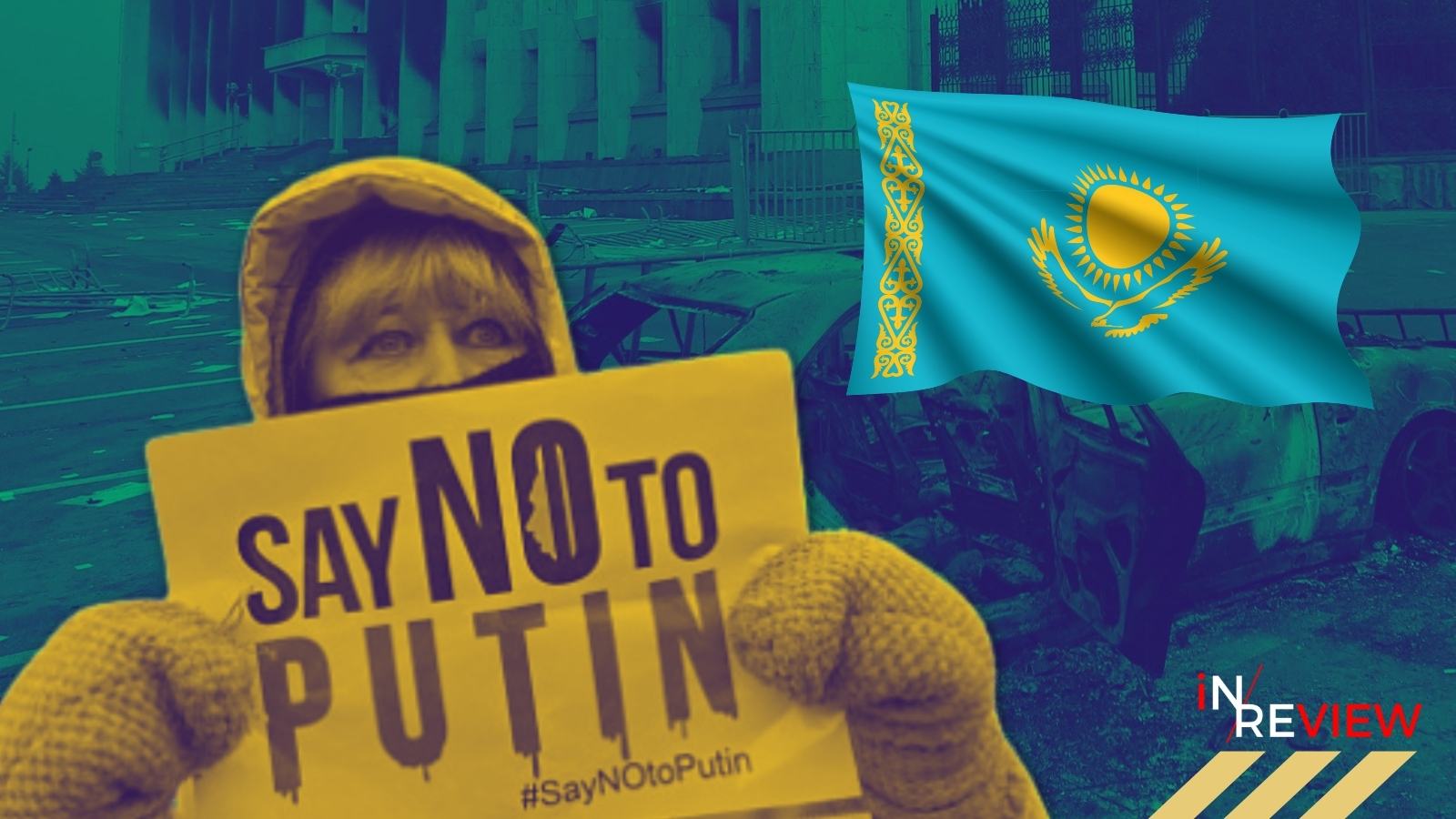
Civil unrest is threatening to destabilise the oil-rich former Soviet republic in Central Asia and the media is desperate to uncover who’s to blame and the consequences of the uprising.
Here we examine what’s behind the crisis and the political consequences.
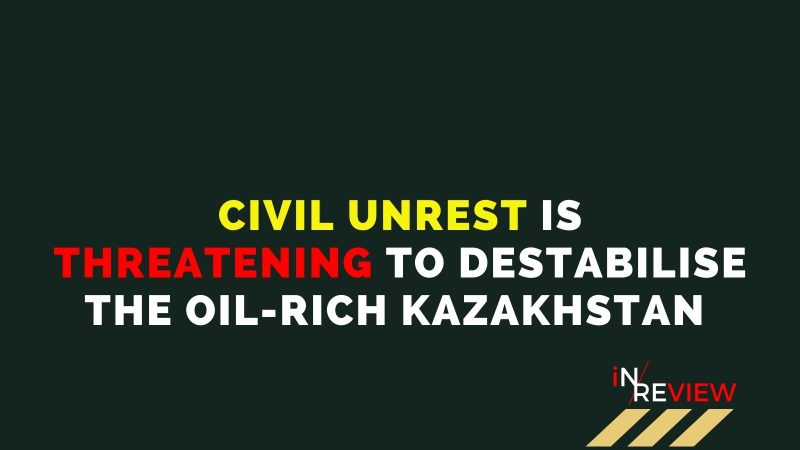
Kazakhstan is a country that shares its borders with Russia to the north and China to the East. It is a huge country the size of Western Europe.
Kazakhstan is a former Soviet republic that has vast mineral resources – including 3 per cent of global oil reserves and important coal and gas sectors.
Kazakhstan has been in the news recently due to the fuel riots which have escalated to wider protests against the government – leading to government resignations and a bloody crackdown on protesters. The ongoing protests have seen deaths and injuries, a five day internet blackout and the arrival of Russia ‘peacekeeper’ troops.
Vladimir Putin pedals outside fears claiming ‘the unrest in Kazakhstan that has so far killed 164 people was the result of foreign meddling.
“The events in Kazakhstan are not the first and far from the last attempt to interfere in the internal affairs of our states from the outside,” said Putin.
“The measures taken by the CSTO made it clear that we would not let anyone destabilise the situation at our home and implement so-called ‘colour revolution’ scenarios,” he added.
The CSTO has never before deployed troops, and according to an article from the Guardian, ‘many in Kazakhstan expressed unease’ at the presence of Russian troops.
Putin believes former Soviet nations should fall into Moscow’s sphere of influence, according to the Guardian. The Russian president has regularly dismissed popular uprisings as “colour revolutions” organised and paid for from abroad. Putin believes what’s happening in Kazakhstan highlights the dangers of social media and unrestricted internet use.
The Kazakhstan events took the Kremlin and others by surprise. The protest started over fuel price rises, has spread rapidly across the country, and according to the article, ‘were taken over by violent groups who stormed government and the airport, followed by widespread looting.’
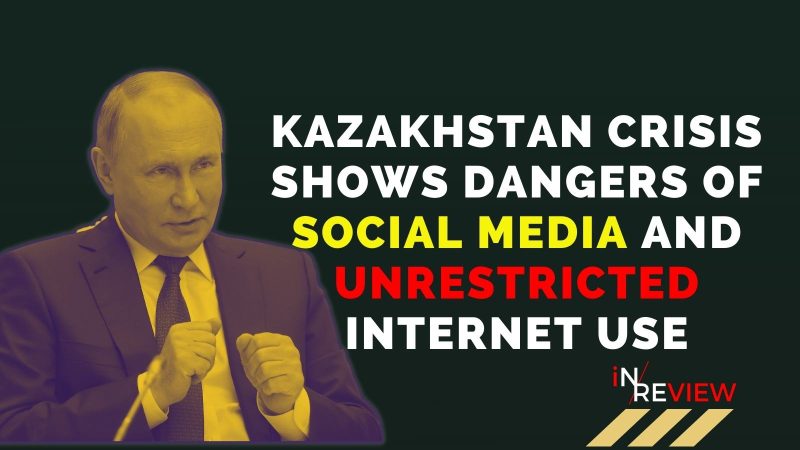
The Kazakhstan president called the protests against him ‘a coup’ launched by unspecified internal and external forces. “Under the guise of spontaneous protests, a wave of unrest broke out … It became clear that the main goal was to undermine the constitutional order and to seize power. We are talking about an attempted coup d’état,” he said. He also claimed trained Islamist fighters were involved in the unrest.
Tokayev described the protesters as “bandits and terrorists” and when explaining why no evidence of a foreign terrorist connection has been established, the Kazahkstan president claims the terrorists had attacked morgues and stolen the dead bodies of their comrades “in order to cover their tracks”. The Guardian highlights the story appears to contain gaps and inconsistencies.
There are concerns over how transparent any investigation into the uprising will be. No evidence has yet been presented of foreign backing for the unrest but many on the ground speculate the fast-moving protests were used by groups inside the Kazakh elite to settle differences.
Read, Foreign meddling behind Kazakhstan unrest, Putin claims, by the Guardian.
The ongoing crisis in Kazakhstan is pushing the government into increased political dependence on Russia, according to an article from the Financial Times.
The nationwide unrest last week, which started with protests that rapidly spread, showed the reforms of the past 30 years have still failed to improve the lives of many people.
What started as protests over a rapid fuel price hike quickly saw other political movements and activists spring up – demanding political and economic changes and peaceful protests were quickly hijacked by ‘criminal groups’.
President Tokayev gave order to shoot to kill “terrorists” as a way to deal with the unrest.
The violent suppression of the protests is a sign of a power struggle within the regime ruled until recently by Nazarbayev
Tokayev called on the Russia-led CSTO to send in ground troops to quell the unrest, undermining Kazakhstan’s effort to maintain a balanced foreign policy and forcing it into increased political dependence on Russia.
‘The problems with Kazakhstan’s failed reforms are multiple’ writes FT, as Nazarbayeb ‘engaged technocratic elites in designing them, the strategy was developed primarily to match his personal vision.’
The country drew inspiration from western practises and Singapore’s economic miracle. Former president Nazarbayev’s administration hired consultants including former UK PM Tony Blair for advice on building a positive image at home and abroad.
The methods ‘offered superficially attractive but shallow solutions to complex problems of economic inequality, social mobility and political aspirations.’
FT says the government failed to understand the impact of its reforms at grassroots level.
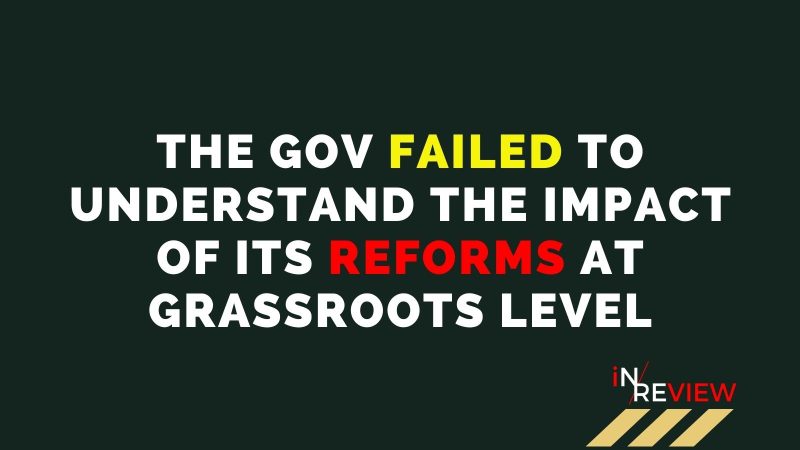
“Economic and political grievances grew. Well-organised unions campaigned against labour conditions in oilfields. Loosely connected political movements in urban areas demanded a more open political system. Police reforms instituted after the deadly shooting of protesters in the western city of Zhanaozen in December 2011 had little effect.”
Kazakhstan spent a decade experimenting with western policing models, but mid-level and rank-and-file police officers didn’t have the skills or resources to implement those models, and instead focused on pleasing the regime bu reporting only positive outcomes.
Large scale corruption is also a mahor problem and although the country’s economic growth has been “remarkable” by the World Bank’s standards, politically loyal elites were the chief beneficiaries of the country’s vast energy resources.
The country’s oligarchs – including members of Nazarbayev’s family funnelled their wealth into UK real estate and rural areas have lost out.
The oil-rich western regions are ‘relatively poor and politically under-represented’, according to FT. They say locals survive on small salaries and loans from banks controlled by people from the regime’s inner circles.
The nation’s wealth is not in the hands of its brightest minds.
Despite the large scholarship programme to support students’ study at top universities across the globe, only a handful of the country’s new generation of highly educated young professionals are involved in top-level decision-making.
The post-Soviet generation of Tokayev and Nazarbayev continues to hold the keys to political power.
The country’s reform efforts were expensive but the cost of the regime of ignoring grassroots grievances has proved to be even higher. Kazakhstan can still catch up with advanced post-industrial nations – but to achieve it the regime needs to meet the expectations of its people.
Read, Kazakhstan pays the price for ignoring public discontent on Financial Times
Aljazeera looks at how tribal identities still affect the public and political life of the troubled nation. The article asks if clan-rivalry can explain the current crisis.
“Relations between different clans or tribes in is a side of Kazakh society that is not immediately visible to outsiders, even to those living and working in the country,” Ivar Dale, a senior policy adviser with the Norwegian Helsinki Committee, a rights watchdog, who lived in Kazakhstan for several years, told Al Jazeera.
Kazakhstan’s former president Nazarbayev, his successor Tokayev and many top government officials half from the Major – or Elder Zhuz that dominates the most densely-populated southeastern regions.
But the foundation of Kazakhstan’s post-Soviet wealth is the hydrocarbons frilled in the stomping ground of the Younger, or Minor Zhuz in the country’s west, next to the Caspian Sea, one of the biggest sources of untapped hydrocarbons on Earth.
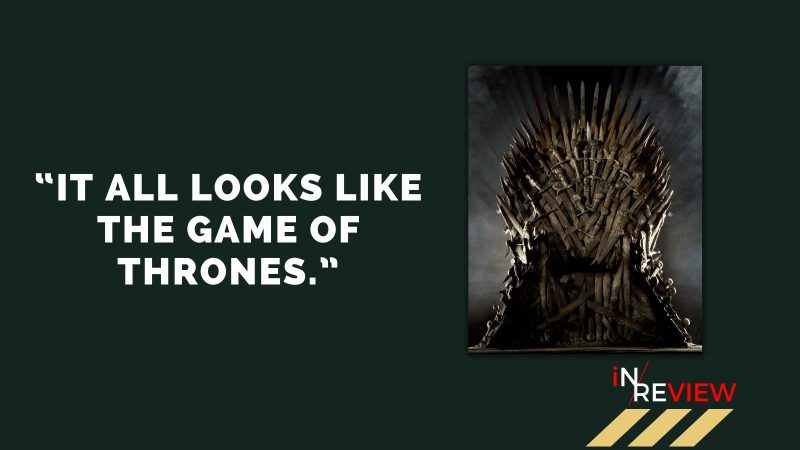
The unfair distribution of wealth, coupled with inflation, economic fallout triggered by the pandemic and corruption, sparked the initial protests in western Kazakhstan. Most of the protesters in the beginning (before it turned violent) were blue-collar men who pierced their financial straits as a consequence of clan inequality,
“Kazakhs understood very well what they demanded – they wanted to abolish the Shaprashty clan power and an equal participation of all the Zhuzes and clans in the country’s social and financial life,” Moscow-based historian Andrey Zubov wrote.
Incumbent President Tokayev may have shared their dissatisfaction because he hailed from another clan within the Elder Zhuz – and was widely seen as a nominal figurehead installed by Nazarbayev whose kin and clan retained the real power, including the control of intelligence and law enforcement agencies.
The recent protests, analysts blamed the emergence of armed “protesters” on Nazarbayev’s proteges and nephews who decided to use the peaceful rallies to overthrow Tokayev.
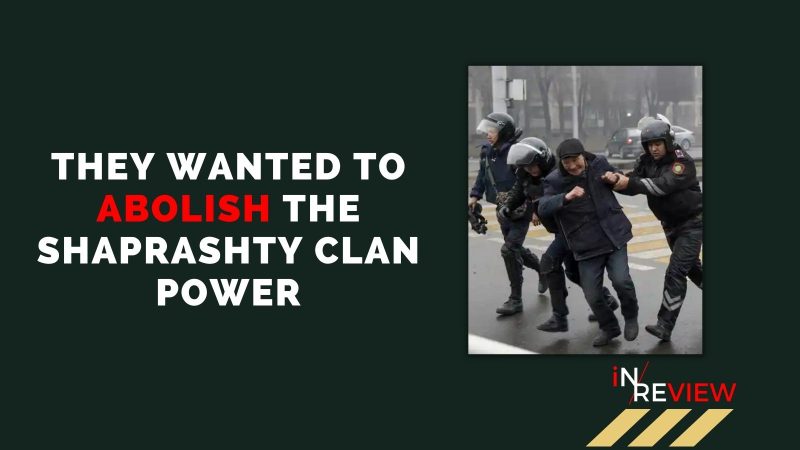
“What is obvious is that Nazarbayev left the scene … But his clan, his family’s law enforcement and business empire fiercely resist as they don’t want to lose their financial assets and power,” Moscow-based Central Asia expert Daniil Kislov told Al Jazeera.
Commenting on the possibility of purges in the halls of power, among Kazakh clans and in Nazarbayev’s family, an Almaty resident told Al Jazeera: “It all looks like the Game of Thrones.”
Read, Can centuries-old clan rivalry explain the crisis in Kazakhstan? By Aljazeera
The political consequences of the protesting in Kazakhstan are examined by Yevgeniy Zhovtis, a prominent activist in Almaty. He explains the causes and potential effects of what Aljazeera calls ‘unprecedented unrest’.
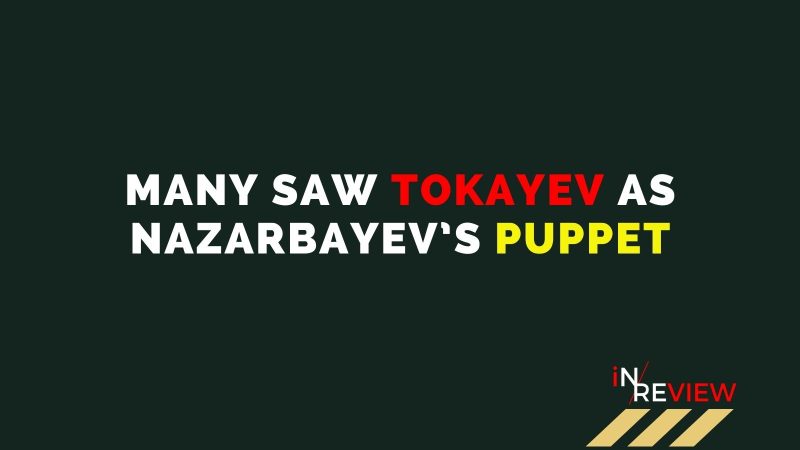
Aljazeera says the protests and violence last week came as a surprise. What started as peaceful protests over rising fuel prices in a western town spiralled to other cities ‘where socio-economic grievances were shared’. Protesters demanded the end of what they and many observers see as a corrupt political system.
Initially, President Tokayev initially promised to lower fuel prices, he then dismissed the government and removed former president Nursultan Nazarbayev, the symbol of the system, as the head of the powerful Security Council.
The protests turned violent, and Tokayev called on Russian troops to intervene. Official data suggests 8,000 people have been arrested and dozens have been killed including police officers and protesters. The real toll could be higher, as reliable information is hard to gather in the tightly controlled former Soviet state.
In a conversation with Al Jazeera, Yevgeniy Zhovtis, an Almaty-based Kazakh human rights activist discusses the crisis.
The article says the situation has strengthened Tokayev, who is now placing his people in power positions and he has become the head of the Security Council – a move that in a way symbolises the end of the Nazarbayev era.
It’s unclear what will happen next, but it’s crystal clear that Tokayev is becoming an independent and strong figure.
Read, Do Kazakhstan’s protests signal an end to the Nazarbayev era? For the full conversation on Aljazeera.
English is not nearly as widely spoken as it is in Western Europe, and even Russia. More and more people, though, especially young people, are learning it.
A cultural melting pot of 131 ethnicities, home to stunning nature, including the famed Altai mountains and Kazakh steppe, as well as the Golden Man, the country’s Tutankhamun, Kazakhstan offers the ultimate adventure.
Like its neighbouring countries, Kyrgyzstan and Uzbekistan, Kazakhstan has been placed in Level 1 countries by the US Department of State, meaning it is among the safest countries in the world to travel to! The country is considered to be safer than destinations such as France and Germany, which are Level 2 countries.
On 25 October 1990, Kazakhstan declared its sovereignty on its territory as a republic within the Soviet Union. Following the August 1991 aborted coup attempt in Moscow, Kazakhstan declared independence on 16 December 1991, thus becoming the last Soviet republic to declare independence.

Copyright WTX News 2025
